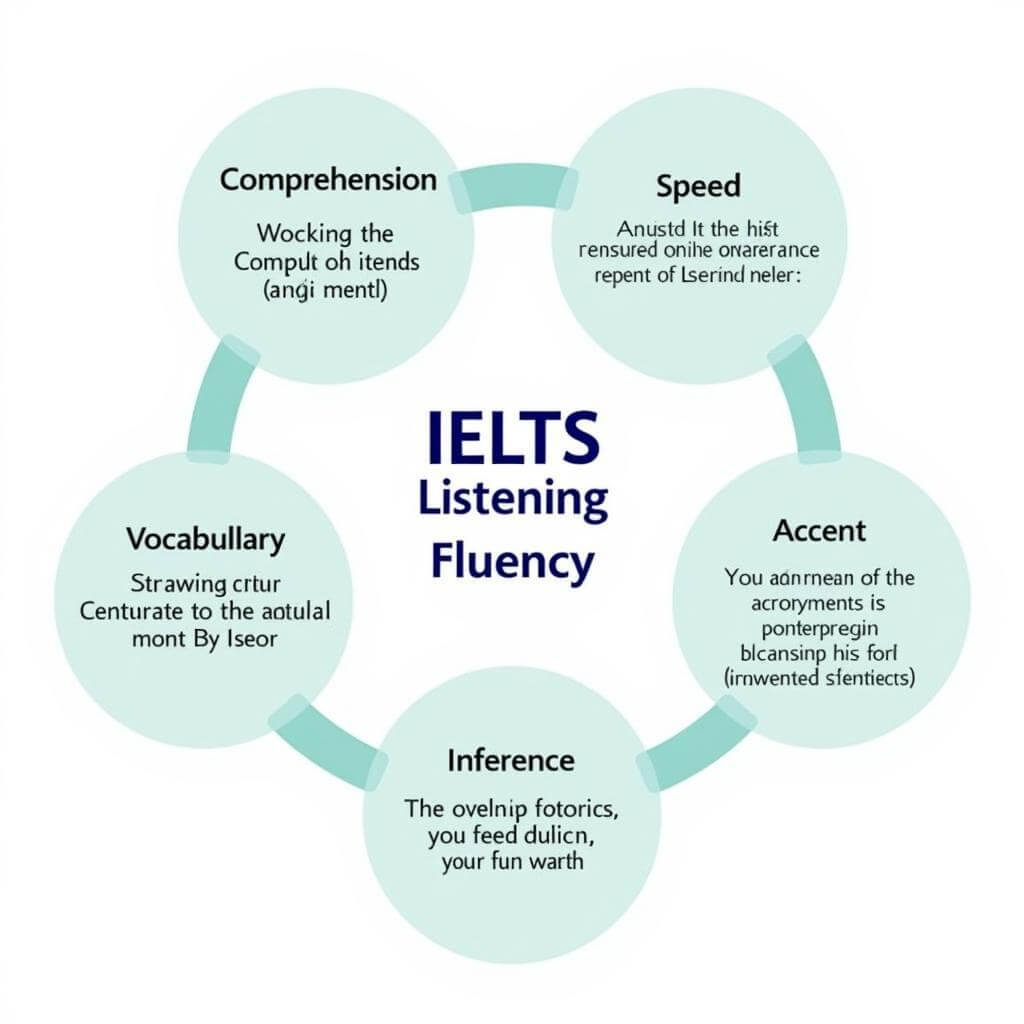Understanding Listening Fluency in IELTS
Listening fluency is a crucial skill for success in the IELTS exam. It refers to the ability to understand spoken English effortlessly and accurately, even when faced with diverse accents, speech rates, and complex topics. Developing this skill is essential for achieving a high band score in the IELTS Listening test.
Components of Listening Fluency
- Comprehension: Understanding the main ideas and specific details
- Speed: Processing information quickly and keeping up with native speakers
- Vocabulary: Recognizing a wide range of words and phrases in context
- Accent recognition: Adapting to various English accents
- Inference: Understanding implied meanings and speaker intentions

Strategies to Enhance Your Listening Fluency
1. Immerse Yourself in English
Surround yourself with English audio content daily. This could include:
- Podcasts on various topics
- News broadcasts (BBC, CNN, ABC)
- TED Talks
- Audiobooks
- English language radio shows
Aim for at least 30 minutes of active listening each day to train your ear and improve your overall comprehension.
2. Practice with IELTS-specific Materials
Use official IELTS practice tests and sample questions to familiarize yourself with the exam format and question types. Pay attention to:
- Multiple choice questions
- Matching exercises
- Form completion tasks
- Short answer questions
Regular practice with these materials will help you develop strategies for tackling each question type efficiently.
3. Develop Active Listening Skills
Engage with the audio content actively by:
- Predicting content based on context clues
- Taking notes on key information
- Summarizing main points after listening
- Reflecting on what you’ve heard
These techniques will help you stay focused and extract important information more effectively.
4. Expand Your Vocabulary
A broad vocabulary is crucial for understanding a wide range of topics in the IELTS Listening test. To improve:
- Learn new words in context through reading and listening
- Study academic word lists
- Practice using new vocabulary in conversations
- Create word association maps to reinforce learning
Remember, the IELTS Listening test covers various subjects, so a diverse vocabulary is essential.
5. Master Different Accents
IELTS features speakers with various English accents. To prepare:
- Listen to speakers from different English-speaking countries (UK, US, Australia, Canada)
- Watch films and TV shows with diverse casts
- Use accent training resources available online
- Practice with IELTS listening materials featuring different accents
Exposure to various accents will increase your adaptability during the exam.
Common Mistakes to Avoid
- Focusing too much on unfamiliar words and missing subsequent information
- Failing to read questions carefully before the audio begins
- Writing answers without considering word limits or spelling
- Losing concentration during longer passages
- Misinterpreting numbers, dates, or proper nouns due to accent differences
Practical Exercises for IELTS Listening Fluency
1. Dictation Practice
Listen to short audio clips and transcribe them word-for-word. This exercise improves your ability to catch individual words and phrases accurately.
2. Shadowing Technique
Listen to a native speaker and repeat what they say in real-time, mimicking their pronunciation and intonation. This helps improve your processing speed and accent recognition.
3. Gist Extraction
Listen to longer passages and practice summarizing the main points in your own words. This develops your ability to understand overall meaning and key details.
4. Gap-Fill Exercises
Use IELTS-style gap-fill exercises to practice identifying specific information and spelling accurately under time pressure.
5. Speed Listening
Gradually increase the playback speed of audio materials to challenge your listening skills and improve processing speed.
Applying Listening Fluency Skills in the IELTS Exam
During the IELTS Listening test, apply your improved fluency skills by:
- Reading questions beforehand to predict content
- Listening for signpost words that indicate important information
- Managing your time effectively across all sections
- Using the given time to check your answers thoroughly
- Staying calm and focused, even if you miss some information
Remember, consistent practice and application of these strategies will significantly enhance your overall listening fluency and boost your IELTS Listening score.
Conclusion
Improving your overall listening fluency is a journey that requires dedication and consistent practice. By implementing the strategies and exercises outlined in this guide, you’ll be well-equipped to tackle the IELTS Listening test with confidence. Remember that progress takes time, so be patient with yourself and celebrate small improvements along the way. Keep challenging yourself with diverse listening materials, and you’ll see significant growth in your listening skills. Good luck with your IELTS preparation!
We’d love to hear about your experiences and tips for improving listening fluency. Share your thoughts in the comments below, and don’t forget to explore our other IELTS preparation resources on IELTS.NET for comprehensive exam guidance.